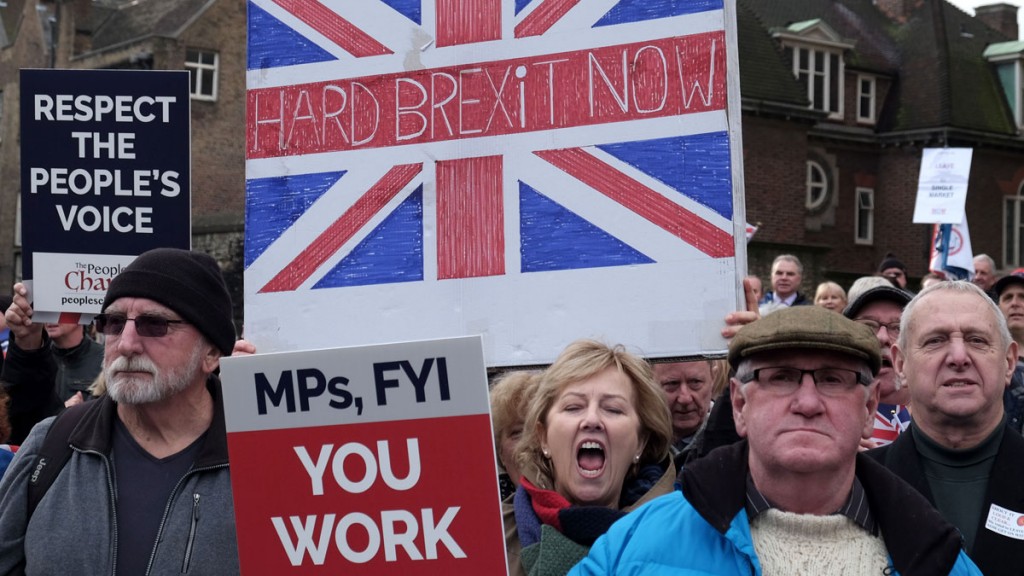
In any discussion over Europe, it’s easy to end up too focused on the theory over the practice. While it’s nice to know what the options are, the main thing is trying to find out what will actually happen.
One person who is plugged into what’s going on behind the scenes is Charles Grant of the Centre for European Reform, a thinktank that bills itself as promoting economic and political reform within the EU and closer transatlantic relations. Grant has been talking to policymakers in both Europe and Britain and so has a view of what is likely to happen, even if he doesn’t necessarily agree with it.
The key point is that he thinks that a soft Brexit seems unlikely, at least at the moment. While he personally would like Britain to stay in the single market, he believes that freedom of movement and the continued jurisdiction of the European Court of Justice are “big barriers” for the government. Indeed, from his discussion with MPs he thinks that Theresa May is “not even considering a Norway-style model”. The position is complicated by the fact that many in Europe are unhappy with the Swiss model because it means that treaties have to be renegotiated every time Europe changes a law.
Of course, if a Swiss/Norwegian deal isn’t on the cards (for various reasons) then it is “almost certain” that we will have to leave the single market. There is some discontent about migration of non-EU citizens, both directly and via other EU countries. There is also controversy about the terms of workers seconded to jobs in other EU countries. However, there is a strong basic consensus in Europe that the “four freedoms (of goods, labour, capital and services) are indivisible”. This means that the best that we can hope for is something along the lines of the Canada-EU deal, free trade in most goods, but with little or no access for services.
Grant also dismisses the idea, floated by some in the press, that Britain can use its contribution to Europe’s security as leverage in negotiations. While he agrees that, properly handled, troop deployments “might buy us some goodwill with eastern Europe” any attempt to link the two explicitly will probably backfire. Indeed, he notes that when the government tried to do this a few months ago with Poland, it went down very badly with Warsaw. Overall, he gets the impression that those involved in negotiating Brexit are “not born diplomats”. Grant also thinks that it’s premature to predict what Trump is going to do with Nato.
The French and German officials that he has spoken to are unanimous that Britain will lose its rights to financial “passporting”. In theory, some firms, such as insurance companies and funds, will be able to get around this, either through European subsidiaries or what’s known as “equivalence” (Britain closely following European financial regulations). The problem is that Brussels is (coincidentally or not) currently rewriting the rules to make it much harder for non-EU firms, especially banks, to do this. Even in the best-case scenario, the City should expect to lose 10-15% of its business.
He’s also sceptical about the chances of quickly negotiating trade deals with third countries. Firstly, we’re not allowed to formally sign any deals before we leave the EU. At the same time many countries, such as New Zealand, are frustrated at the mixed signals that we’re sending out and have made it clear that they are unwilling to even begin negotiating before we clarify our policies. Finally, if we did agree third-party deals we would have to leave the customs union (which specifies a common external tariff).
Grant thinks that leaving the customs union could be particularly damaging. While the Swiss and Norwegians are free to cut their own trade deals, the trade-off is that their exports face extra bureaucracy designed to make sure that companies are not trying to pass off goods made in third countries as domestically produced. In practice this means that goods face additional delays, which could really hit large manufacturing firms with sprawling supply chains.
If Britain did leave the customs union then it might need to rebuild the UK-Ireland border, something that could have disastrous implications for the peace process.